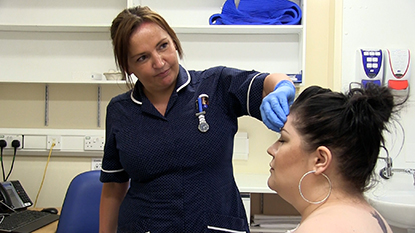Trust Headache and Migraine services blazing a trail at a national level

Ground-breaking work from the Trust’s headache team is providing improved patient outcomes and national leading innovations for one of the world’s most under-recognised conditions.
Headaches are one of the most common symptoms in humans and tend to affect women far more frequently than men. For such a common condition, the impact is often underappreciated, as Consultant Neurologist, Dr Stuart Weatherby explains: “According to the World Health Organisation, migraines are the second leading global cause of years lived with disability, and headache conditions are a frequent cause of urgent neurological hospital admissions, making up over 30% of all referrals to neurology outpatient services.”
Recently, new treatments have been developed which should enable a greater proportion of headache sufferers to get effective help. The Trust has invested by expanding the Headache and Migraine team to help meet this need, and now hosts the largest and most active headache service in the South West.
With the addition of Natasha Wood as Specialist Headache Nurse, the team now has the ability to introduce nationally recommended treatments rapidly at scale. This has increased the capacity of the service by around 50%. “New medications are now available for headache and migraine sufferers who are disabled by their headaches. No one drug is the same for each patient, so it’s important to individualise care,” said Natasha.
“It is such a debilitating condition, particularly for women, and our service has been a crucial lifeline for many patients. Having an expanded service has really improved the outcomes for our patients. For example, we successfully introduced the nationally recommended calcitonin gene-related peptide (CGRP) treatment for migraines, and we were one of the first units in the UK to publish our data on patients with previously hard to manage migraines.”
The data shows the team have found large improvements in reduction of pain and quality of life for patients. And, as the new treatments are administered by the patient in their own home, it has reduced day case admissions in the hospital, freeing up clinic space for other headache patients.
The team has also played an integral part in developing services at a national level for patients suffering from cluster headaches. Nicknamed ‘suicide headaches’, this condition causes extreme pain to sufferers, and is rated as one of the most severe pain conditions that can afflict humans.
New national NHS guidance recommends a non-invasive treatment called GammaCore, which reduces the frequency of cluster headache attacks and reduces the reliance on other treatments in combination, providing a yearly saving of around £450 per patient in the process. As a result, across all hospitals in Devon, Cornwall, Dorset, Avon, and Gloucestershire, 45% of all new treatments have come through University Hospitals Plymouth. In recognition, Becky Stuckey, our Senior Headache Nurse, was recently invited by NHS England to discuss the Trust’s rapid introduction of the new treatment as a blueprint for a future national rollout.
“Unlike migraines which affect around one in seven people, predominantly women, cluster headaches are rare in comparison affecting around one in a thousand people, mostly men,” commented Becky. “Treatments are completely different from migraine treatments. They are painful and carry some hefty side effects. When the opportunity arose to offer the nVNS (GammaCore device) as a treatment, given the limited side effect profile and lack of other options available for this condition, we were very keen.
“Despite GammaCore becoming available three years ago on the NHS for cluster headaches, there is a relatively low national uptake, compared to our use here at the Trust. NHS England recognised this and invited me to present the pathway for this group of patients and to discuss why it was so successful, with a view to rolling it out across the country.”
“With a national shortage of Neurologists, there is a need for more nurse specialists to be providing leading treatments for patients. I think this is one of the reasons we have been so successful, as typically these treatments would be consultant led. Developing a responsive nurse-led pathway, enables cluster headache patients access up to date treatments and prescriptions without the need for consultant time, freeing them up to see new patients.”
The service has also been involved in shaping the national approach to headache care through the use of technology.
Over the last 18-months, Dr Weatherby and fellow Consultant Neurologist Dr Daniel Lashley, have developed a web-based resource system called headache.org.uk, with self-help sections for patients to control the management of their conditions. Complete with educational videos, information sheets and treatment guidance, the site also provides healthcare professionals with the ability to use this during consultations with patients to help guide treatment decisions.
With support from the Royal Pharmaceutical Society, the Royal College of General Practitioners, and the Association of British Neurologists, the National Neuroscience Advisory Group has recommended the system should be embedded within the rest of the NHS to help to improve and standardise the delivery of care nationally.
As a result, last month headache.org.uk collected the Charles Symonds prize from the Association of British Neurologists for the best Quality/Safety project and appeared as a finalist in the Best Technology Solution section of the Leading Healthcare Awards 2022. “The electronic system helps to ensure greater consistency among healthcare professionals, but more importantly puts greater power in the hands of our patients to drive their own care,” said Dr Weatherby.
The team have also learned their work has been shortlisted for several more awards. These include the Outstanding Contribution to Population Health, Innovation Spread, Excellence in Patient and Public Involvement in Transformation and Innovation, Helping Address Health Inequalities, and the Innovative Health System of the Year.


